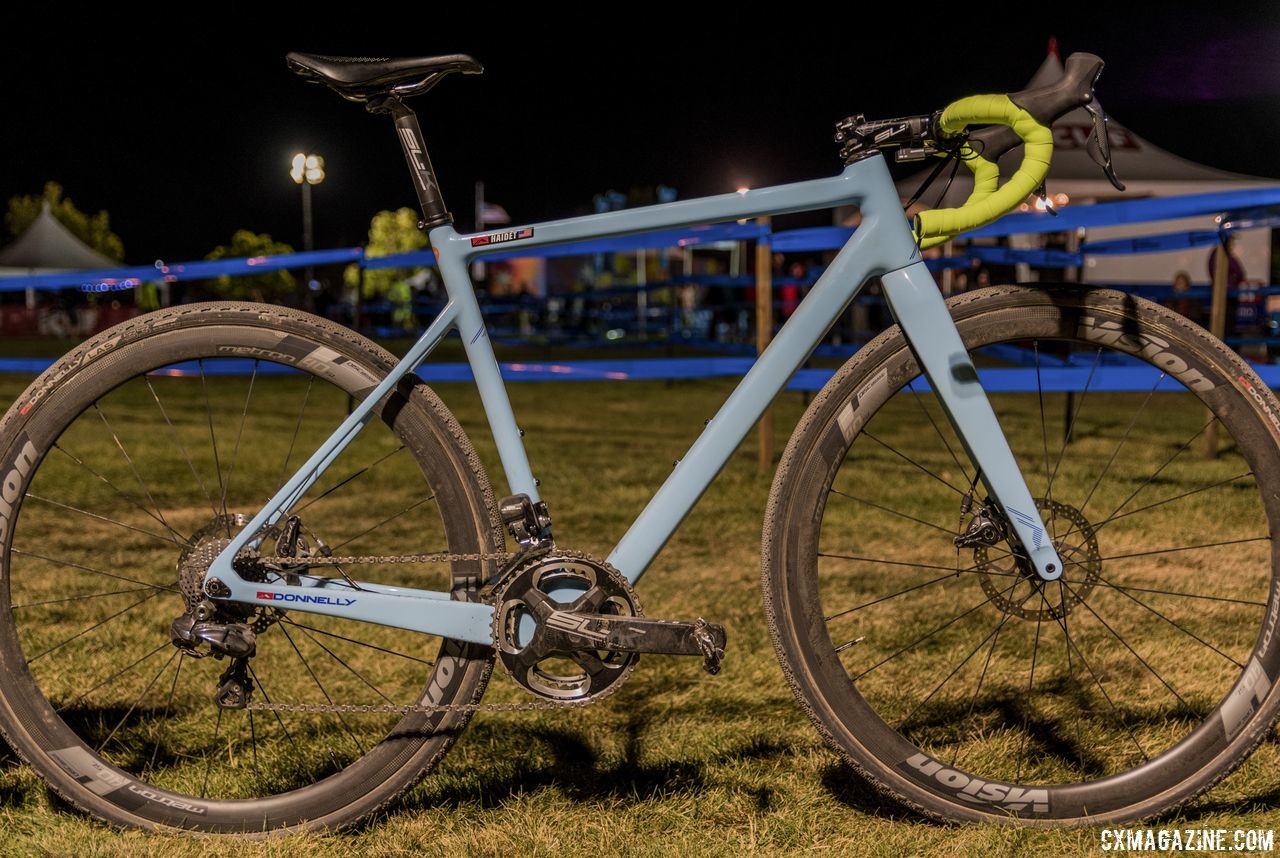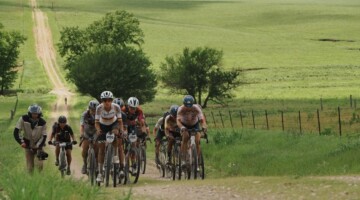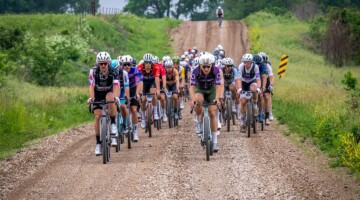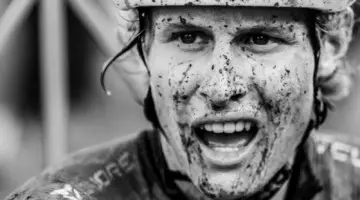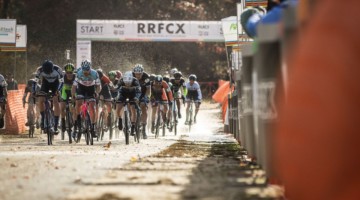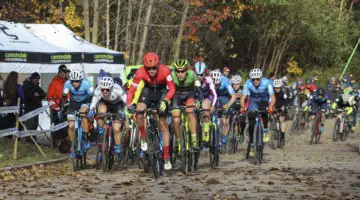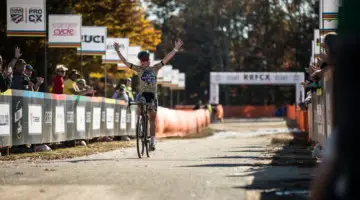The first time Lance Haidet (Aevolo Cycling) won a U23 national championship, he only had to hold the lead up a steep incline and around one last corner. Maybe 200m, tops.
The second time, it was not over as fast.
Last weekend at U23 Road Nationals in Hagerstown, Maryland, Haidet made the race’s final selection with some guys he knows quite well. Cooper Willsey (CCB Racing) and Cameron Beard (Team Defferdange-Geba) were there along with Hugo Scala Jr. (Gateway Devo Cycling / Gateway Harley Davidson).
They were all tired and cramping from an aggressive day of racing, but with one last hill to go about 4km from the finish, Haidet decided to go all-in.
“I hit that climb twice as fast as the rest of the guys in the group, and dude, I was going as hard as I could and I was cramping everywhere, but I felt that if I could make it to the top with a gap, I’d be golden,” Haidet said. “I think by the top of it, I probably had 15 seconds over the other guys. And then I basically died a thousand deaths the last 3km to the finish.”
When a younger Haidet won on the snow and ice of Hartford Nationals, he did so by riding the most consistent race among those in the talented field. He admitted that the confidence to send it on a solo effort for the Stars-and-Stripes is a skill has he worked on.
“Recently, for me, it’s been a lot of trying to get over the fear of losing,” Haidet said. “I think in doing that, you give yourself more of a chance to win, rather than always finishing in the lead group but never getting on the podium. I think what it takes to go for that effort is you have to be willing to lose in order to win, for sure. I was definitely going for it on Friday.”
Haidet’s move paid off, and with it came the second Stars-and-Stripes jersey for his collection as he closed out his U23 racing career.
U23 Road Nats is not the only thing Haidet has been up to recently. Earlier in the month, he joined Alex Howes in demonstrating that the best way to peak for Road Nationals is apparently to race the Dirty Kanza 200, and of course, the Californian is preparing for his first cyclocross season as an Elite.
I caught up with him last week to chat Nats, DK, ’cross and the legend of Lancy Pants. You can read a transcript of our conversation below.
Interview: Lance Haidet, U23 Road Race National Champion
Cyclocross Magazine: To get started, I want to start with some of the hard-hitting journalism questions. How old were you when you decided your Instagram name should be Lancy Pants?
Lance Haidet: It’s actually a fairly good story. I wasn’t on social media growing up, and I didn’t even have a cell phone until I was 15 or 16. probably. My parents were like, ‘No way kid, you do not get a cell phone until you’re driving.’ Basically, that’s what was going on.
I think it was either 16 or 17, I went to MontanaCrossCamp with Geoff Proctor, and it was the first time I surrounded myself with a bunch of cyclists my age. They were like, ‘Oh dude, this thing Instagram, you need to get one.’ The general consensus was that my name would be Lancy Pants. That’s how it happened. Not a whole lot of thought behind it, but it’s a fairly good story I’d say.
CXM: That’s when you were 17, 18, you’re getting darn near being an Elite and an adult here. Are you still going to stick with it?
LH: I don’t know. It’s probably got to go fairly soon. Or not. Maybe I’ll just keep it. I’m fairly immature, so it fits.
CXM: Was it anyone in particular?
LH: I’m pretty sure it was either Cooper Willsey or Cameron Beard, who are the two guys I was on the podium with this past weekend. Maybe Gavin Haley?
CXM: I think he chimed in to congratulate you on social too, didn’t he.
LH: We still chat every once in a while. He lives down in LA now, so he’s like 2.5 hours away, but I rarely see him.
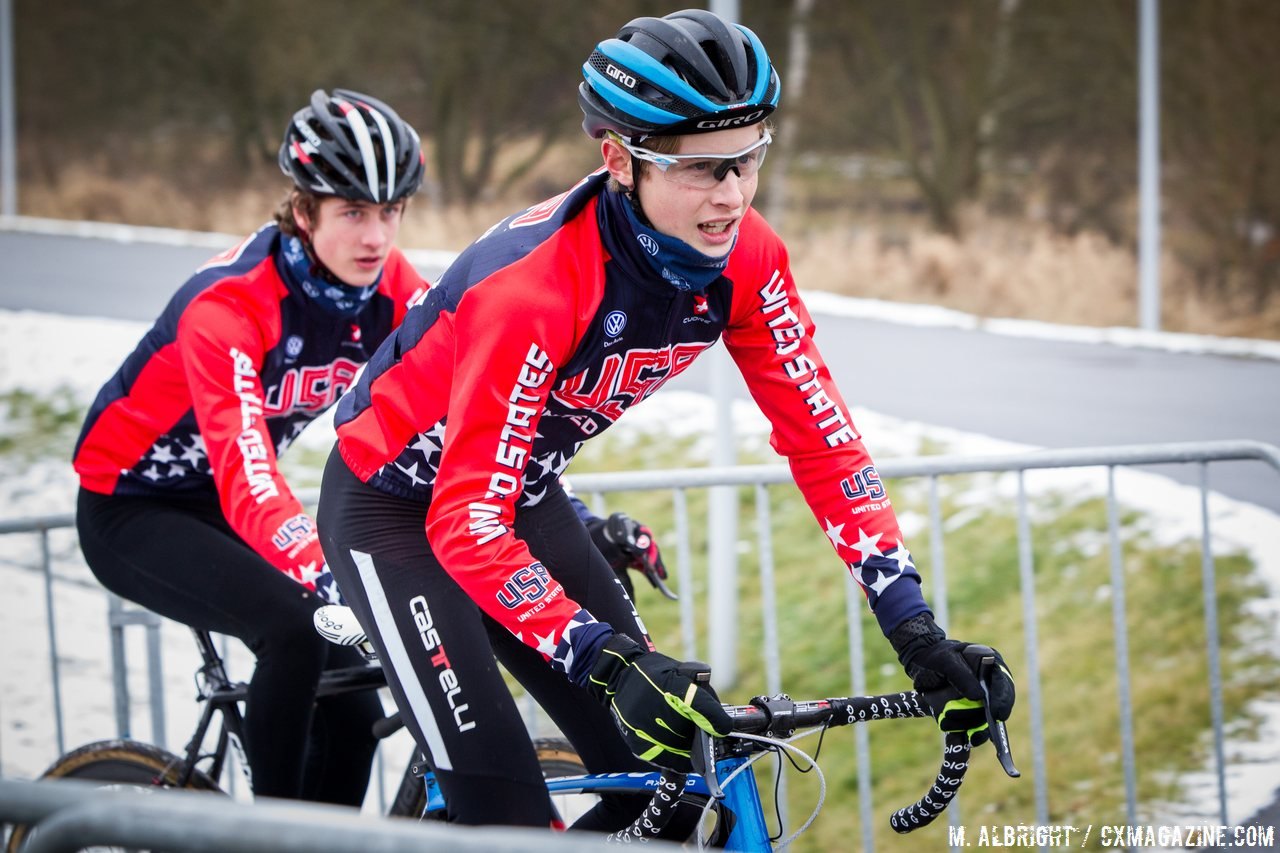
Lance Haidet and Cooper Willsey go way back. 2015 Cyclocross World Championships. © Mike Albright / Cyclocross Magazine
CXM: The other thing someone brought up was we were all impressed by the new ‘do you’re sporting this year? Is there a good story behind that?
LH: Back in the day living up in Bend, I was like a snowboarder and stuff like that, and I had pretty darn long hair. I sort of hadn’t really grown it out at all since then. This year at the end of ’cross season it was getting fairly long, then at winter road team camp, all the guys were like, ‘You gotta keep it. You gotta grow it out.’
Especially Alex Hoehn, because at the time, we were both growing our hair out, and his for some reason grows way faster than mine. Back in February our hair was the same length, but now he has 3 inches on me. We were like, we gotta do it, we’re the Flow Bros.
This year, we haven’t had a lot of hot races so far, so it’s been fairly okay. But I think as the summer continues, it’s going to need to be trimmed quite a bit.
CXM: From the outside and the way you’re describing it, it seems like you get along really well with so many of your peers. What have those relationships meant to you personally and in improving as a cyclist?
LH: On my road team, for sure, I’m with these guys most weekends of the summer. One they’re all my friends and two, even if they aren’t my friends, I still have to spend time with them, so we learn to get along. On our team, everyone is really close, and we’re honestly more friends than most of the friends we have at home because we’re together so much. We get to suffer together, and I think that creates somewhat of a special bond.
Within the cyclocross community, the guys my age like Gage and Spencer and Cooper and all those guys, we’ve been racing together since we were 15, 16 years old. Growing up together and getting to go to Europe and having these crazy, cool life experiences is something I can’t really say I’ve done with some of my best friends back home. It’s pretty cool.
CXM: Speaking of cool experiences, top 20 at Dirty Kanza, how did that go?
LH: Dude, that was awesome. Going into that, I didn’t know what to expect at all. Wanting to focus on the road, I was like, ‘I can’t train for a 200-mile race and still expect to be fast on the road.” So I decided to go into it somewhat blind and hope it works out.
In reality, I had so much fun. It was so cool and such a totally different kind of racing from anything I’ve ever done. Cyclocross or road, you’re always having to be hyper-focused and either trying to conserve energy or attack to benefit you and your position, but at Kanza, there’s so much time you’re out there by yourself playing mind games to continue wanting to pedal your bike. It’s pretty crazy.
Dude, also just the overall vibe and the sheer number of people at Kanza is so impressive. It’s something pretty darn special.
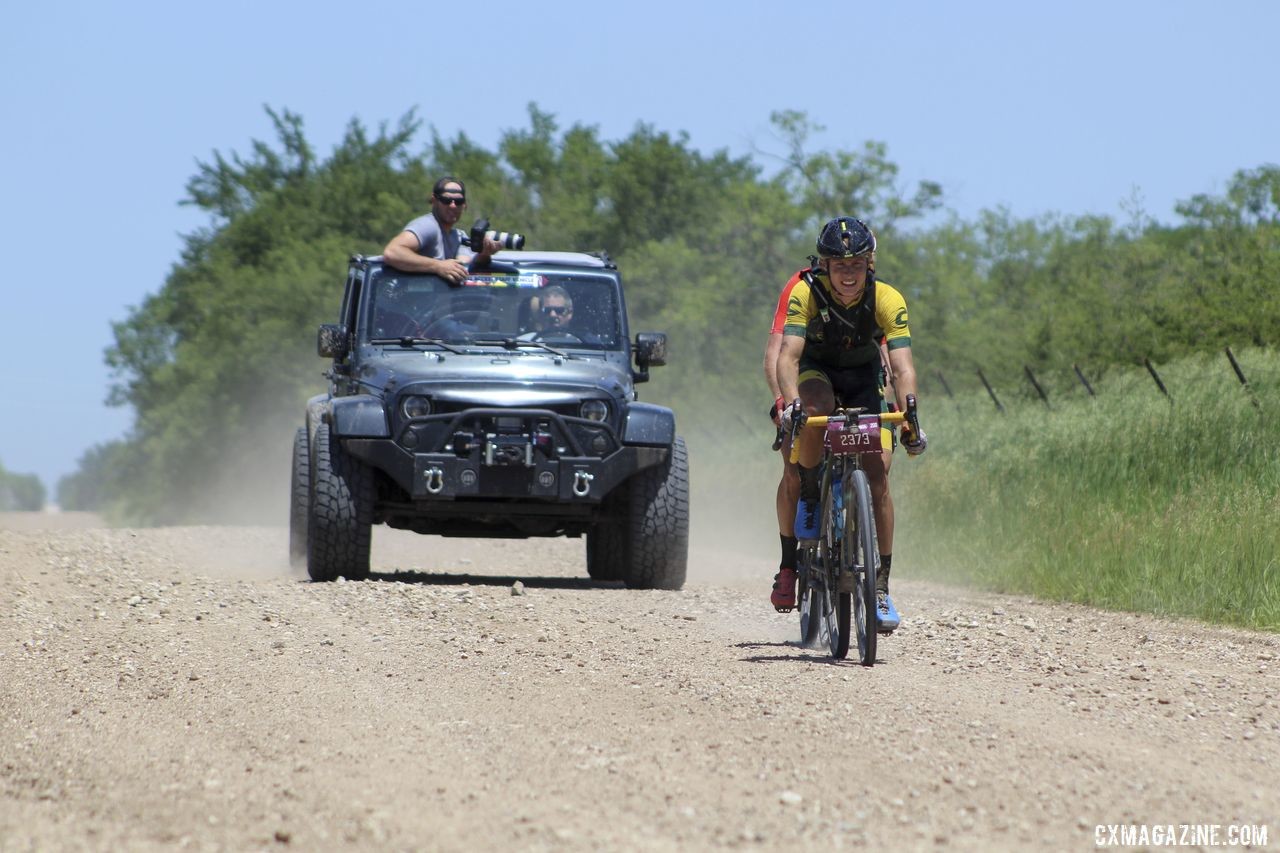
Haidet raced the 2019 Dirty Kanza 200 and finished in the top 20. 2019 Dirty Kanza 200 Gravel Race. © Z. Schuster / Cyclocross Magazine
CXM: I remember last time I chatted with you, you had your Pivot outfitted for gravel, so gravel isn’t new for you, right?
LH: I’ve done Lost and Found up in the Sierras a couple times. I did Crusher in the Tushar last year. Also just for training, I ride a lot of gravel. It wasn’t super new. The only thing is I’ve never done that kind of distance and having to bring a Camelbak and all my own stuff. Most of the other gravel events are like 6 hours or less, so they’re half the length. And most of the aid stations are stocked with stuff you can just grab, where Kanza you’re sort of on your own until the checkpoints and then you have to have your own team there. That was definitely different.
CXM: Before the race, Craig Richey, who finished top 10 last year, wrote some advice about the race, and he was just like, ‘Look man, you’re going to be wrecked. Don’t plan on racing for a while.’ So I thought it was interesting seeing your Aevolo team racing DK three weeks before Road Nats. Did you have confidence that was the right decision, and why did Michael Creed want to send you guys to Kanza this year?
LH: With the road scene in the U.S., some people would say it’s dying, but I wouldn’t say that. I would say there’s not quite as much momentum as there is in the gravel or cyclocross scenes. You can see it with the EF guys as well, we wanted to broaden what a cycling team is. Not just saying we’re only a road team.
Cannondale, which is one of our big sponsors, was interested in that as well. They were supportive in getting us bikes and making sure we had support while we were there. That made the experience a lot easier. Everything just sort of worked together to make it happen.
Also, having Gage and Cade as cyclocross guys doing the gravel thing, it’s something we were definitely interested in. When [Michael] threw out the idea in an email, the three of us responded in like five minutes saying, ‘Hell yeah, let’s do this.’
Going into it, to be honest, I was a bit afraid. My old teammate Jamey Driscoll did it last year, and he was like, ‘Oh man, it’s pretty gnarly. You’re going to be super tired and jacked up for at least a couple weeks afterward.’ He’s a mentor and a close friend, so that gave me something to worry about with Road Nationals coming up. We were racing up in Canada two weeks after Kanza, then there were Pro Road Nationals the week after U23 Nationals. Hopefully this doesn’t backfire. Working with my coach trying to figure out how best to recover, it ended up working, but I definitely understood what Jamey was saying.
I think a large part of that was after cyclocross season, I took a bigger break than I ever had going into the road season. Honestly, the first half of the road season I barely raced at all and didn’t do a whole lot of the major events that I had in years past. I think coming into Kanza not firing on all cylinders 100% allowed it to be a fitness boost for me rather than a crush your soul sort of event.
I know a lot of guys who were training for Kanza and full gas going into it. Then they do Kanza and feel super slow and sluggish for like a month after. For me, it seemed to work out pretty well, which I’m thankful for.
Also, the key for me after long events like that, my body’s weird, but some people after a really hard event or stage race will take time off the bike, but for me, I was sort of like, I’m super tired, but I still want to be on the bike and clear some of that stuff out so it’s not such a shock to the system where my body is shutting down. I did three or four days of easy riding after it and then sort of went right back into hard training after about a week. It seemed to clear everything out fairly quickly, which was good.
CXM: The thing you have to remember is JD is a dad now, he’s in his 30s, you’re a bit younger.
LH: He has a few more things on his plate than me.
CXM: Getting back to what we’re here for, winning a national championship, it sounds like you might have a plan to copy. Do DK, win a national championship.
LH: I think it’s possible. We raced up in Canada the week before Nationals, and I felt super good and super strong there. Then I felt awesome this past weekend at Nationals. Maybe racing Kanza before road events is a thing, we’ll see.
CXM: I look at your team I see a lot of strong dudes on your team. What was your team conversation heading into Road Nats and your plans for the race? Who was going to be the leader, who was going to help, that kind of thing?
LH: We knew going into the race we were definitely one of, if not the, strongest teams in terms of the guys we have and the way we race together. Alex Hoehn being the champ last year and just being crazy strong and fit, he was definitely who we were trying to keep safe for the first half of the race in hopes guys would get tired out after doing a whole lot the first half of the race, and then maybe something would end up going up the road in the second half and we could get him up there.
We were also wanting to keep Michael Hernandez in case it came down to a group sprint. We are really confident in him. We saw that in the Crit on Sunday when he took the win there. He was in the cards, for sure.
Then Gage and I were sort of the two floater guys. We were covering stuff early just in case something went up the road and no one wanted to chase it back, but we were also trying to conserve ourselves a little bit to do something similar to Alex or help Michael in a field sprint. Then Cade Bickmore, Riley Sheehan and Andrew Vollmer, they probably burned more calories than the rest of us combined. They were all over the front the first half of the race covering everything. They did an amazing job with that.
We didn’t necessarily want to be the aggressors in the race, but we followed everything. I think a lot of the other teams expected us to try to blow things apart, which definitely made the first lap or two pretty slow, just because other people were looking to us to do something. We were like, ‘Dude, we’re just chilling. We’re waiting for you to make something happen. Then we’ll take advantage of it when you guys all get tired. It will be great.’
That was sort of our plan. Over the course of the race, there were literally 15 separate groups that ended up getting time on the field and then brought back. The winds had a pretty big impact on the race. There were some ripping crosswinds that would tear the field apart.
Then a lap, lap and half left to go, my group got up the road and initially had both me and my teammate Riley up there. He did some massive pulls to get the gap situated. With him covering stuff all day, he was pretty gassed at that point. From there, it went down.
CXM: I was looking for him at the results sheet because I knew he was in the break, and he went from the last break to like 70th.
LH: Yeah, he spent every last bit of energy to help me. He is the man, for sure.
CXM: You race ’cross, it’s relatively straightforward, you go as hard as you can. But you’re a smart dude, engineering student, do you enjoy that mental, tactical side of road racing?
LH: I do. I think it makes it interesting. Cyclocross is fairly straightforward, but there are also a lot of factors that can go into you not winning a race even if you are the strongest, like mechanicals, conditions, changing lines. There’s always question marks every single corner you go into.
I guess there are a lot of things that can go wrong on the road, but a lot of that is tactics rather than mechanicals and mistakes that can be made. I like the tactical side of it and playing mind games with people is always pretty fun. It’s good. Sometimes road racing can be a bit boring when it’s four hours of nothing. In those cases, I’d rather be on my ’cross bike ripping for an hour.
This last week, the road race was on all the time, which I think was super cool.
CXM: So you got down to five or six, then Riley popped off and it was down to four. What were your thoughts about the other guys in the break and how were you approaching the last 15km?
LH: It was originally six of us, and then Riley popped off, so it was down to five. At that point, we were all still pulling through and everyone was working hard. As we got to that 15km to go part, one of the guys stopped taking pulls and started trying to gap people off and do crazy stuff, but it turned out he was totally boxed because he popped off a couple km later. Then it was down to four of us.
At that point, through the radio, I heard from Creed that Alex Hoehn was trying to bridge across solo to our break, which gave me the upper hand over the other guys in the break. I was like, ‘Dude, my teammate is coming up. He’s 15 seconds behind us. You can either let him catch us, or you guys can keep pulling and there’s only one Aevolo guy instead of two.’
That allowed me to skip a couple pulls and not totally thrash myself on the front because my teammate was trying to come across. His effort was awesome. The dude rode 15 seconds behind us for the last 10km of the race suffering like a dog. That effort truly helped me so much.
Then with 4km to go, there was like a minute-long climb. I knew all of us were pretty tired going into that, and it had already been a long day. I knew if I hit that climb pretending the top was the finish of the road race, that was probably my best hope. I’m a fairly okay sprinter from a reduced group, but I’m definitely not overly confident in my sprint. Cooper [Willsey] has a really good snap and is super crafty, so he was definitely who I was worried about the most coming down to the line.
I definitely wanted to go early. I hit that climb twice as fast as the rest of the guys in the group, and dude, I was going as hard as I could and I was cramping everywhere, but I felt that if I could make it to the top with a gap, I’d be golden. I think by the top of it, I probably had 15 seconds over the other guys. And then I basically died a thousand deaths the last 3km to the finish.
CXM: You look back and see you have some space, what was going through your head?
LH: Everything in your body is telling you to stop pedaling. Your muscles are cramping, you feel like you’re going to have a heart attack, but the only thing I was thinking about was, Stars-and-Stripes, Stars-and-Stripes, Stars-and-Stripes. That was the only thing that kept me going. At that point, I was 100% committed. If they ended up catching me, I was going to get whooped in the sprint, so I put everything I had left into it. Luckily, it worked out.
CXM: It seems like that takes a little bit of courage to make that choice. You can stay with the group and maybe I’ll win, pretty good shot at second. You go all-in, you’re going to win, or you’re finishing fourth.
LH: Yeah, it’s all or nothing. I’ve always been a bit more of a conservative racer over the years. Growing up, I was never really the strongest guy, so I was always conservative with my efforts, hiding, never taking massive risks because I didn’t think I was strong enough to do it.
Recently, for me, it’s been a lot of trying to get over the fear of losing. I think in doing that, you give yourself more of a chance to win, rather than always finishing in the lead group but never getting on the podium.
I think what it takes to go for that effort is you have to be willing to lose in order to win, for sure. I was definitely going for it on Friday.
CXM: It’s interesting you say that because another person reminds me of you, friendly dude, strong dude, Michael van den Ham said that when he won his first Canadian Nats. He had finally figured out how to win races. What worked for you to change your mindset?
LH: I don’t know exactly. I think I’ve had a bit of a change in mindset in training and racing. In the past, even when I was doing intervals at home, it was all about doing efforts as smoothly and efficiently as possible so I can hold this power or whatever. Being smooth and efficient was always going through my mind.
But what I’ve been doing a lot recently, instead of thinking that way, it’s more thinking about how I can faster. How can I go faster? How can I go faster? I think that’s helped me a lot in training. It’s easy to tell yourself outside of racing that you’re going to try these gutsy moves and go solo to win the race, but in the moment when you’re cross-eyed, your mind is telling you to stop, and it’s pretty easy to listen to that. Or at least hold up a little bit.
For me, it’s constantly reassuring myself that I can do it. After races when I did something wrong or didn’t go with a move I should have, I go back and think, ‘Man, I really should have done this. I know I was hurting at that time, and it felt like I couldn’t, but I probably could have.’
CXM: The last time we chatted about a national championship, you had to hold a lead, but it was only for like 200m. You’re a couple years older, different discipline, how does this one compare to getting that first U23 national championship?
LH: The first one was pretty amazing. I race road, but I started racing cyclocross, and ’cross has definitely been my focus for my entire career, so that was so special. Being a second-year U23 winning Nationals with Curtis White and those guys in the race, I was super proud of winning.
But this one, winning on the road is hard. I have done so many races, even just local stuff where I feel like I’m the strongest guy there, but dude, it’s so hard to win a road race because tactically so much has to go right. You can sit on the front and put in so much, and some dude you didn’t see all day can out sprint you at the end. In ’cross as long as things don’t go wrong and you’re able to limit your mistakes, the strong guy and the best guy on the day normally wins.
Where in road, there have been a lot of days I thought I was going to win and didn’t even come close. Winning this past one was pretty darned awesome. Also, there is a lot of depth in those road fields, so it feels pretty amazing to win that one.
But I’m not sure which one I’m more proud of. I’m not totally sure. They’re both pretty darn special.
CXM: You’ve got some time. This one was four days ago or whatever.
LH: Good point.
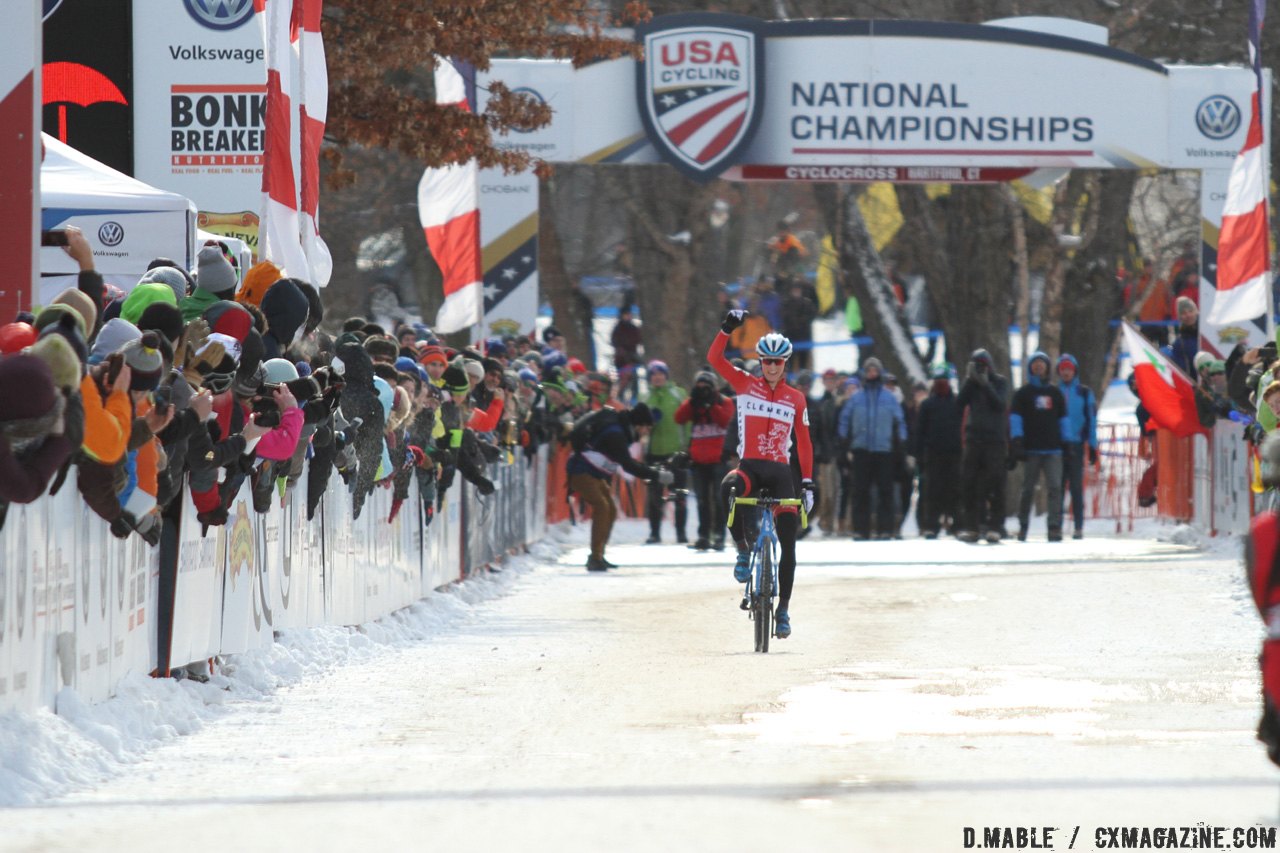
Haidet won his first national championship in the Hartford snow and ice. 2017 Cyclocross National Championships – U23 Men. © D. Mable / Cyclocross Magazine
CXM: When you won Nationals in Hartford, you were dealing with back issues and watching you race the next year, it seemed like the whole being conservative applied to your racing. But I think you made a statement at the start of last season, hanging with the lead group at Rochester, winning at RenoCross. Has anything changed for you? You seem to be a bit of a different racer now.
LH: I definitely think so. Mentally and physically, I think I made quite a few strides this past year. I’ve gotten stronger and more confident, which I think is what has shown the most.
My back is still an issue, and it’s something I have to do a lot of work with. I’m constantly doing core stuff, constantly getting massages or rolling on the foam roller, I do a lot of that stuff just to feel okay. But it’s also something I’ve sort of grown accustomed to. Originally I was always just angry and pissed when my back hurt and it totally bummed me out, but now, it’s something I’ve just come to deal with. It’s just something I’d obviously like to fix, but I’ve definitely found ways to manage it.
It’s hard because when I do everything perfectly, my back is pretty darned good, and it’s never absolutely terrible, but if I go a week or two without focusing on it, it gets bad. It’s still my weak link, I’d say, but hopefully if I continue to put in the work, it will only get better.
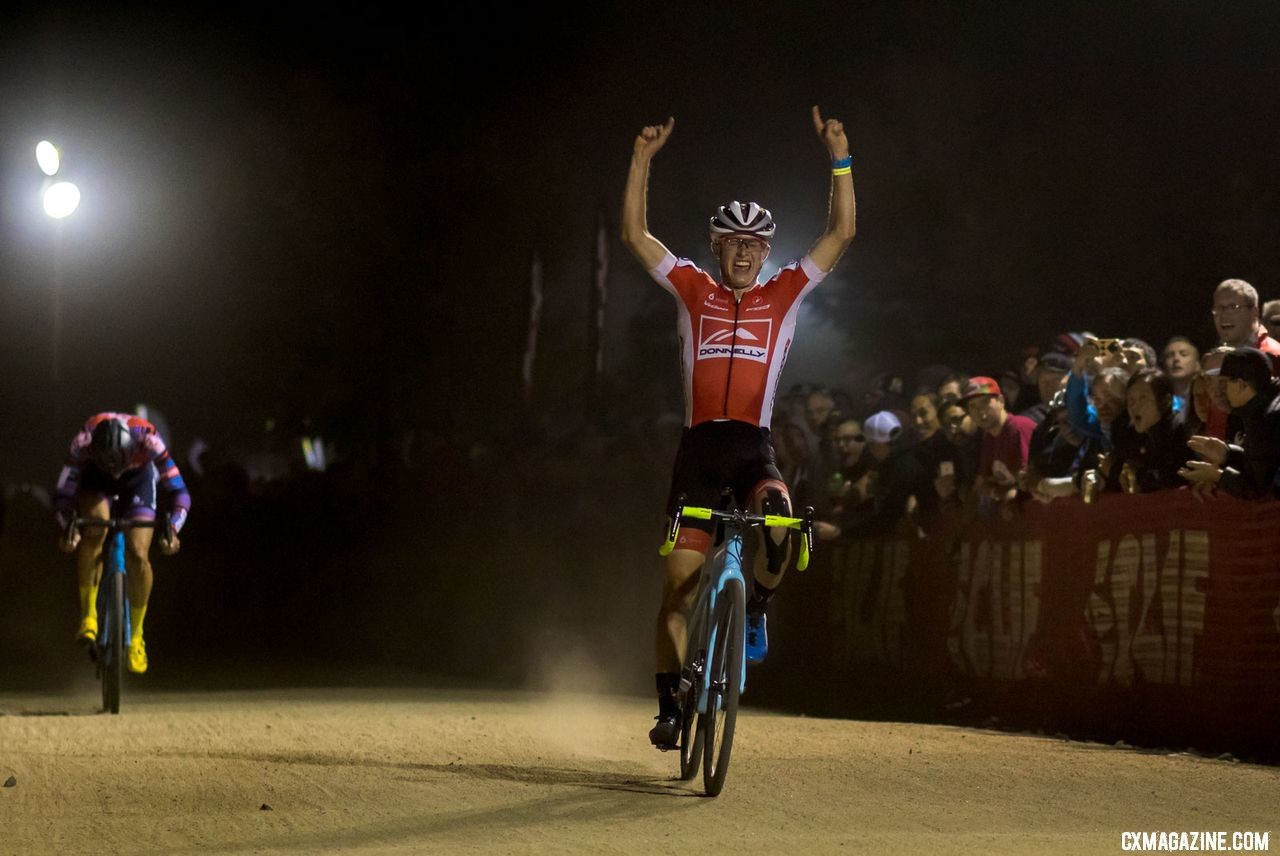
After a disappointing Nationals, Lance Haidet was ecstatic with his 2018 RenoCross win. © A. Yee / Cyclocross Magazine
CXM: First year as an Elite coming up, right?
LH: Yeah.
CXM: In a way, you’re kind of lucky you’re leaving the U23s with the amount of talent in that field.
LH: It’s crazy. Just growing up with these guys, it’s amazing how many really good riders there are. It’s awesome.
CXM: We always talk about the future of U.S. and U.S. cyclocross and look at Europe and performing on the world stage. Do you feel any pressure, or opportunity, of doing something on the international stage given there are so many strong young guys?
LH: Definitely. The international level is certainly the top tier of cycling in road and cyclocross, and with so many strong young guys coming up in the U.S., I think the future is definitely bright. If we can make it over there, I think that is the goal for every one of us. The goal is to go over to Europe and show what we’re doing in the U.S. is working and we can show up against all the Euro guys.
I’m still trying to figure out how to make it possible. Personally, I want to finish school before heading over there and trying to send it. But yeah, I think talking among all the guys I hang out with and race with, going over and racing in Europe is definitely the end goal.
CXM: I’m excited. Ever since that U23 race in Hartford, getting to follow you guys has been fun.
LH: I appreciate it.
CXM: Looking forward to the ’cross season, you’ve got Stephen and Curtis and Gage and Kerry expected to be at the top. You were definitely there at times, but what do you think it’s going to take to be there consistently at the top of the domestic scene?
LH: Another year of strength will definitely help. I think the mental side of things I’ve been working on is definitely going to help. And then also being better about one, keeping my back good to go by focusing on that stuff and two, I think I can do more ’cross-specific stuff than I have in the past. Just effort-wise. I ride my ’cross bike a lot and do a lot of off-road riding with it, but incorporating more race simulation style efforts will help rather than going out and doing 4 5-minute VO2Max efforts, doing some running and agility-type things.
Other than that, we’ll just have to see. I’m definitely shooting to be up with those guys this year.
CXM: Are you with Donnelly again this year?
LH: Yep.
CXM: What do you think of the new ’cross bike?
LH: Dude, I love that thing. I’m not just saying that because I have to. I really like it. At first when Donnelly was talking of making bikes, we were talking about making one bike that was sort of a do-everything that could do gravel and do ’cross, but we would say it’s a ’cross bike that can do adventure stuff as well.
I think the fact the company ended up going with a pure cyclocross bike and a pure gravel bike was definitely the right move. That ’cross bike is awesome. It handles so well, and it’s so snappy and fast that personally, for a cyclocross racer, it’s perfect. Everything from mud clearance to looks to performance, it’s the real deal.
CXM: Awesome. Thanks for your time and congrats again on national championship number two. Looking forward to seeing you this fall.
LH: You bet man, thanks so much.














